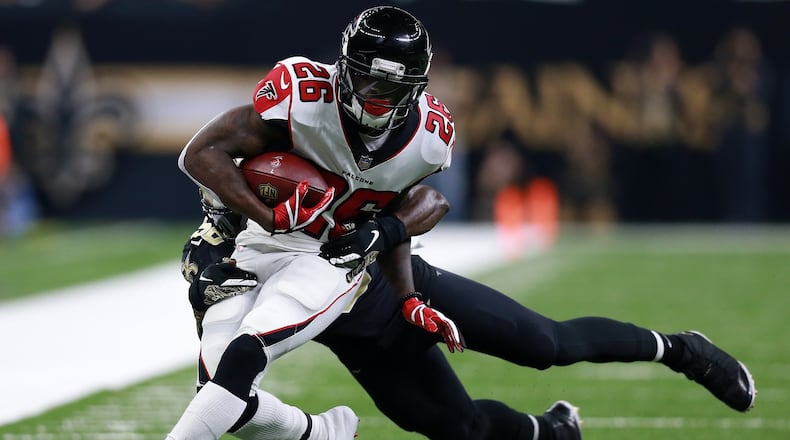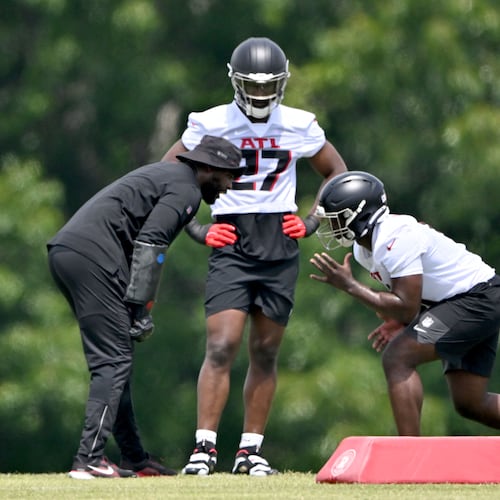As the Falcons began preparing to play and run for their postseason lives, a query came that seemed to catch coach Dan Quinn just a little off-guard, which is where they’ve had the biggest problem running.
The numbers are dank and perhaps staggering for the Falcons (4-7) as they ready themselves for Sunday’s game against the Ravens (6-5).
They boil down to this: The run game has been mush, so do you look at certain run plays while practicing and scrap them out of the game plan because they’ve been mud?
“That’s a big question. ... There would certainly be some that you would say you know what, we’ve given this a shot and it’s not working at the level that we want so we would put that one on ice,” he said. “... To answer your question, yes there would be some that would be taken out ... Yes, we would get rid of some.”
And they might take out players, too.
The Falcons have struggled to run anywhere. Just see their rankings as the NFL’s No. 31 rushing team (83.1 yards per game), No. 32 team in run plays executed (33.1 percent of all plays), and No. 32 team in rush yards as a ratio of total offense (20.8 percent) attest.
It’s been worst when they’ve tried to run off right guard, where their average of 2.13 yards per run is easily last in the NFL, so they apparently are swapping newcomer Zane Beadles in for Ben Garland, who stepped in two months ago when Brandon Fusco went down with a blown ankle.
Quinn’s not confirming this roster move, but you can see it in the small part of practice that reporters are allowed to witness.
No confirmation is needed to say that injuries have hurt the running game – and pass protection – just as injuries have capped the defense.
Starting guards Fusco and Andy Levitre are gone, and running back Devonta Freeman is out as well. That’s a lot of “hurt-ness,” almost symmetrical when stacked against defensive boo-boos.
“It’s certainly hard when you have a talented player like him; he makes a ton of plays for us,” Ryan said of Freeman’s absence. “ So, it’s always difficult to replace those guys.”
“To me, we don’t call plays differently for our guys. The way they might run them might be a little different, but the calls, the calls are really the same.”
This is the same: the Falcons have struggled running the ball everywhere.
Seven times in 11 games they’ve rushed for 74 or fewer yards, and only twice have they surpassed 100 -- in wins against Carolina and Washington.
The last outing, a 31-17 loss at New Orleans on Thanksgiving, was worst.
On 16 carries, they amassed 26 yards. Ryan led the way with scrambles of nine and seven yards. Running backs Tevin Coleman and Ito Smith did almost nothing. Coleman: eight carries, six yards; Smith: four carries, zero yards.
That was not new. In the past three games, the Falcons rushed for 71, 80 and 26 yards without a touchdown.
With the idea of talking about the run game, or lack of one, a spin through the locker room Wednesday in search of principal characters availed no Coleman and no Smith.
Center Alex Mack was scheduled to hold a mini-news conference, but didn’t. Right tackle Ryan Schraeder passed on a chance to talk with reporters when he said something about having to get dressed quickly because practice was about to start (in 25 minutes or so).
Left tackle Jake Matthews cruised through the locker room without stopping. There was no sighting of left guard Wes Schweitzer.
Ty Sambrailo stood still for a few moments, not that he seemed to like it. There have been suggestions that he might see action Sunday, presumably at right tackle.
He acknowledged that running the ball for 26 yards flat out stank, but didn’t stink as much as losing for the third consecutive time.
“You know, I think obviously as offensive linemen we like running the ball; we take pride in running the ball, so ...,” he said. “It hurts more to lose. All we care about at the end of the day is getting wins, so if we have to throw the ball 70 times to win a game we will, but obviously we want to run the ball well. We take pride in that.”
Quinn surely doesn’t want to throw 70 times a game. He wouldn’t be proud of that. He wants to run the ball better, but maybe the run calls – rare as they are – have been more wrong than right.
Offensive coordinator Steve Sarkisian said, “I think everybody has a part in it to some degree. It’s the game plan and what we are putting in. Then it comes down to the execution of it. Then ultimately doing our job on game day.
“Putting it all together, the right combination of it all, then going out and doing it at a high level. Call the stuff at the right time, it all adds up. For us to be the offense that we know we’re capable of being, that piece has got to get going for us.”
The Falcons have run most often to left end (60 times) and right end (41 times).
Yet they rank No. 30 in the NFL on those left-end runs (3.43 yards per try) and No. 27 when they go right (4.07). Last year’s numbers: 5.34 yards at left end, and 4.95 yards at right end.
When they go behind left tackle (Matthews), they average 4.69 yards (No. 10 in the NFL).
When they go behind left guard (Schweitzer), they average 4.42 yards (No. 11).
And get this, when they go right tackle (Schraeder), they average 5.78 yards (No. 7).
Yet right tackle runs rank No. 6 among the seven possibilities for the Falcons.
Their order of run preference goes left end (60 runs), right end (41), left guard (31), right guard (30), left tackle (29), right tackle (27) and center (11).
So, what’s the decision-making process on run calls?
“There’s a lot that can go into it,” Quinn said. “Do they use an eighth defender to get into where you can get into position to block that player? ... The second piece would be what is the look that you’re going against. In other words, if you’re trying to get the ball outside and there are two players ready to set the edge, that’s not the side to go. You may check at the line of scrimmage.
“Then the last piece is, what has that team struggled with? What are some styles of runs that they may have had a hard time defending; this team you can get to the perimeter or it's really tough to run inside based on the size of the defensive tackles. So, a lot that would go into it.”
So, that’s a lot to yield little, and that’s an abridged version of what Quinn said.
When the Falcons have run on third-and-1, they’ve converted nine of 15. On third-and-2, they’re 1-for-3. They’ve run for success on one of two fourth-and-1 situations.
And they average just 3.49 yards running the ball on first-and-10.
They need to be better on the run, and call better runs.
“As we get through, by Friday afternoon we’ll say, OK, we’re going to keep continuing to go with this one or let's take two or three out of the plan altogether,” Quinn said. “So it’ll take me and the staff a full three days to get to that spot.”
About the Author
Keep Reading
The Latest
Featured


